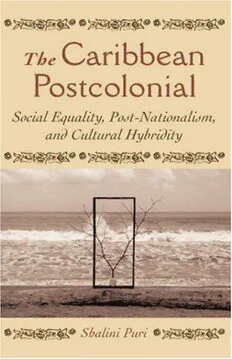
The Caribbean Postcolonial: Social Equality, Post-nationalism, and Cultural Hybridity PDF
313 Pages·2004·1.222 MB·English
Most books are stored in the elastic cloud where traffic is expensive. For this reason, we have a limit on daily download.
Preview The Caribbean Postcolonial: Social Equality, Post-nationalism, and Cultural Hybridity
Description:
Exploring the relationship between discourses of cultural hybridity and projects for social equality, The Caribbean Postcolonial reveals a far greater diversity of political and aesthetic practices of cultural hybridity than has been generally recognized in postcolonial and cultural studies. It uncovers the logics according to which some forms of hybridity are enshrined and others disavowed in the Caribbean imagination and in the disciplinary imagination of postcolonial studies. Exploring cultural formations ranging from mestizaje and creolization to mulatto and dougla aesthetics, from literature to music, theater, Hosay, and carnival, it examines the sources of the appeal of cultural hybridity for both nationalist and postnationalist agendas. The first book-length study to offer an explicitly comparative account of cultural hybridity in the postcolonial arena, The Caribbean Postcolonial is a forceful argument for historicizing theory. It intervenes in key debates around popular agency and cultural resistance, feminism and cultural nationalism, the relations between postmodernism and postcolonialism, and the status of nationalism in an era of globalization.
See more
The list of books you might like
Most books are stored in the elastic cloud where traffic is expensive. For this reason, we have a limit on daily download.
